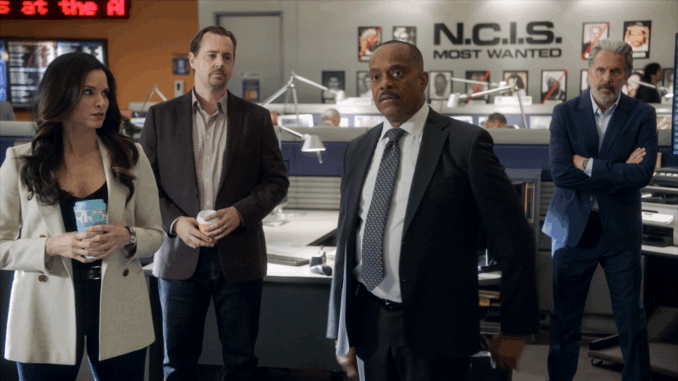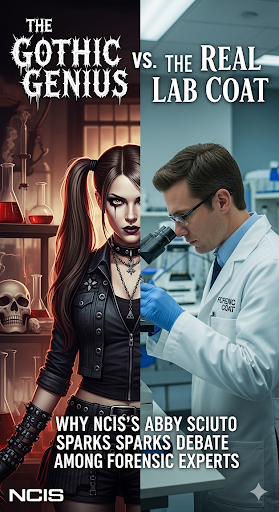
For more than twenty years, NCIS has been a cornerstone of primetime television, blending military intrigue, high-stakes investigations, and the quirky dynamics of a team that feels more like family than colleagues. And at the center of that family, for 15 memorable seasons, stood Abby Sciuto — the forensic scientist with jet-black pigtails, Gothic chokers, an endless supply of Caf-Pow! energy drinks, and a mind so brilliant it seemed she could crack any case before the first commercial break.

Played with eccentric charm by Pauley Perrette, Abby was not just a character — she was a pop-culture phenomenon. Fans adored her, she inspired countless Halloween costumes, and she made science look fun, cool, and even edgy. For many viewers, Abby was the heart of NCIS.
But ask a real forensic scientist about Abby Sciuto, and you might get a different story. To them, Abby is less a beacon of scientific brilliance and more an amalgamation of Hollywood fantasy — entertaining, yes, but hopelessly unrealistic.
In fact, retired crime scene investigator Matt Steiner recently reignited the debate in an interview where he bluntly called out Abby’s portrayal as “fundamentally inaccurate.” His critique highlights a larger issue that has been simmering for decades: the growing gap between how television dramatizes forensic science and how the field actually operates in real life.
The Myth of the All-Knowing Scientist
At first glance, Abby seems unstoppable. In a single episode, she might run a DNA test, analyze blood spatter, examine gunshot residue, hack into a suspect’s encrypted laptop, and whip up a chemical analysis — all before the team finishes lunch.
To viewers, this makes her look like a superhero in a lab coat. But to Steiner and other forensic professionals, it’s pure fiction.
“Real forensic science doesn’t work that way,” Steiner explained. “Each specialty is its own world. A DNA expert isn’t going to be the same person who handles ballistics or toxicology. In real labs, there are entire departments staffed by people who’ve dedicated their careers to one very specific branch of science.”
In other words: no single scientist, no matter how brilliant, could do Abby’s job. Her wide-ranging expertise — from digital hacking to ballistics — would take not just one PhD, but several lifetimes.
It’s not just unrealistic. Experts argue it misrepresents how vital collaboration is in real-world investigations. Forensic science is a team sport, not a one-woman show.
TV’s Obsession with Instant Results
Another major sticking point for critics is Abby’s speed. In NCIS, DNA results, fingerprint matches, and toxicology reports appear almost instantly — sometimes within minutes.
In reality, these processes are painstakingly slow. A DNA test can take weeks, sometimes months, depending on the backlog of cases in a state lab. Digital forensics — especially hacking into devices — can be even more time-consuming.
The problem isn’t just inaccuracy; it’s influence. Legal professionals have even coined a term for it: the CSI Effect. Thanks to shows like CSI, Bones, and NCIS, jurors now expect quick, definitive results in real trials. Prosecutors often face uphill battles explaining why certain evidence can’t be produced on demand. And when jurors don’t see the kind of “smoking gun” evidence TV has conditioned them to expect, they’re more likely to acquit.
As Steiner warns, “The public wants TV timelines in real courtrooms. That’s not just unrealistic — it’s dangerous.”
The Professionalism Problem
For many real-life scientists, Abby’s scientific shortcuts are only part of the issue. The way she works is another.
On NCIS, Abby’s lab is a chaotic mix of bright colors, clutter, and rock music. She bounces between evidence samples, occasionally without gloves, and her relationship with the rest of the team feels more like a sibling bond than a professional dynamic.
It’s fun television. But it would never fly in a real lab.
In reality, forensic scientists follow strict chain-of-custody protocols. Contamination is one of their greatest fears, and even a minor slip — touching evidence with bare hands, wandering into a crime scene without proper gear — could compromise a case. Evidence mishandled the way Abby sometimes does would likely be tossed out in court, jeopardizing entire investigations.
“Abby’s brilliance makes it seem like rules don’t apply,” Steiner noted. “But in the real world, rules are everything.”
The Larger Legacy: Inspiration or Misinformation?
Despite the criticism, it’s impossible to deny Abby Sciuto’s cultural impact. She wasn’t just a character; she was a symbol.
For young viewers, Abby made science exciting. Countless fans have said they pursued degrees in criminology, chemistry, or forensic science because of her. She humanized the field with her quirks and compassion, proving that scientists didn’t have to be stiff or humorless.
But there’s a flip side. By presenting an unrealistic version of the job, NCIS has also contributed to widespread public misconceptions. It has blurred the line between entertainment and reality, sometimes with real-world consequences in the courtroom.
And that duality is Abby’s true legacy: she is both a gateway into science for fans and a frustrating symbol of misrepresentation for professionals.
Entertainment vs. Reality
At the end of the day, NCIS isn’t a documentary. It’s a drama. The writers knew what they were doing — they weren’t trying to produce a science textbook, but a fast-paced, character-driven show. And by that measure, Abby Sciuto was an undeniable success: she was beloved, memorable, and helped make NCIS one of the most-watched shows in the world.
But as Steiner and his colleagues remind us, it’s worth remembering where Abby Sciuto ends and forensic science begins. She’s a TV creation, a character designed to entertain. And while her lab may not resemble a real one, her cultural footprint remains unmatched.
Maybe the truth lies somewhere in the middle. Abby isn’t a model forensic scientist — but she is a reminder of how powerful storytelling can be. She made millions of viewers care about science, even if the science wasn’t always real.
And in the world of television, that may be its own kind of forensic magic.